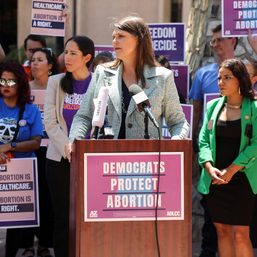SUMMARY
This is AI generated summarization, which may have errors. For context, always refer to the full article.

MANILA, Philippines – The Commission on Human Rights (CHR) is against abortion except in “extreme circumstances,” the commission confirmed in a letter to Senate President Juan Miguel Zubiri on Wednesday, November 15.
The letter came a day after the Senate deferred the discussion on the CHR’s 2024 budget. Senator Alan Peter Cayetano had brought up the issue of abortion during the plenary discussion of the CHR’s budget, and pressed the agency on an earlier statement made by Executive Director Jacqueline Ann de Guia supporting the decriminalization of abortion.
CHR budget sponsor Senator Jinggoy Estrada said the statement was made by the CHR’s fifth commission under the late former chairperson Chito Gascon.
Cayetano said such a statement was “dangerous” and against the Constitution, while Estrada said the CHR could receive “zero budget” if it did not clarify its stand on abortion.
“The Commission on Human Rights…considers paramount the right to life. The commission similarly adheres to the 1987 Philippine Constitution specifically, to ‘equally protect the life of the mother and the life of the unborn from conception,’ and is therefore, AGAINST abortion, save for extreme circumstances,” the CHR said in its letter, which was signed by Chairperson Richard Palpal-latoc, and commissioners Beda Epres, Fayda Dumarpa, and Monina Zenarosa.
“Extreme circumstances” was annotated with a footnote that said “termination for medical reasons.”
International bodies for decriminalization
In a September 2022 statement, De Guia pushed for the decriminalization of abortion, among other policies, as a piece of legislation that would advance gender empowerment and women’s rights.
In the budget hearing on Tuesday, November 14, Cayetano had said that pushing for the decriminalization of abortion for when the mother’s life is in danger is a “weak excuse.”
“‘Pag dine-criminalize mo, [para mong sinabi na] puwede na ‘yun. How can you protect the unborn if you’re not going to put any penalty [on] people who abort the fetus o baby? Jaywalking nga lang mayroon tayong penalty eh,” said Cayetano.
(If you decriminalize it, [it’s like you’re saying] that it’s fine. How can you protect the unborn if you’re not going to put any penalty [on] people who abort the fetus or baby? Even jaywalking is something we have penalties for.)
But several international bodies have recognized abortion as a reproductive health rights issue, and have recommended its decriminalization.
As early as 2006, the Convention on the Elimination of All Forms of Discrimination Against Women (CEDAW) Committee of the United Nations’ human rights office recommended that the Philippines remove punitive provisions on abortion. Almost two decades later, in a 2023 report, the committee “noted with concern” how there was a lack of progress in the Philippines to decriminalize abortion and address the high number of unsafe abortions.
The committee recommended that the Philippines “ensure that women and girls, including rural women and girls, unmarried women and women and girls with disabilities, have adequate access to sexual and reproductive health services and information, including family planning, modern forms of contraception, and safe abortion and post-abortion services.”
It also recommended the amendment of articles 256 to 259 of the Revised Penal Code to legalize abortion in cases of risk to the life or health of pregnant women, as well as rape and incest survivors, and decriminalize abortion in other cases.
Meanwhile, the World Health Organization also recommends the full decriminalization of abortion, and includes comprehensive abortion care in its list of essential health services.
“These recommendations are not mere suggestions but reflect the human rights obligations of the government to fully realize reproductive rights in the country where over half of the female population are women of reproductive age,” said Jihan Jacob, associate director for legal strategies in Asia at the Center for Reproductive Rights, in a release from the Philippine Safe Abortion Advocacy Network (Pinsan).
Prevalence of unsafe abortions
The Philippines has highly restrictive laws against abortion, but this does not stop Filipino women from trying to induce them. According to Pinsan coordinator and lawyer Clara Rita Padilla, around 1.26 million Filipino women induce abortion yearly, and around three women die each day due to lack of access to safe abortion.
“Penal law is not the answer. The restrictive archaic penal law on abortion has never reduced the number of Filipino women who induce abortion but only places their lives at risk due to lack of access to abortion. Maintaining this restrictive law perpetuates discrimination against women, undermines a woman’s personal decision, and imposes conservative religious beliefs on others,” said Padilla.
The lawyer added that restrictive abortion laws not only affect women inducing abortion, but women who suffer from naturally occurring pregnancy complications, such as spontaneous abortions or miscarriages, intrauterine fetal demise, and incomplete abortion, where women are denied access to legal therapeutic abortions and post-abortion care.
“Furthermore, the Commission on Human Rights is an independent constitutional body as enshrined in the Philippine Constitution. The Philippine government must comply with the UN Paris Principles to maintain the independence of CHR,” Padilla said.
The decriminalization of abortion, even in emergency cases, remains a contentious topic among Catholic-majority Philippines. In the 2022 campaign period, President Ferdinand Marcos Jr. disclosed his pro-abortion stance for severe cases, but the women’s rights sector continues to urge the President to manifest his progressiveness in his policies. – Rappler.com
Add a comment
How does this make you feel?
![[OPINION] Why we need to decriminalize abortion](https://www.rappler.com/tachyon/2020/09/need-to-decriminalize-abortion-September-26-2020.jpg?fit=449%2C449)














![[WATCH] Bamban POGO scandal: There’s a bigger fish than Alice Guo](https://www.rappler.com/tachyon/2024/07/inside-track-tcard-bamban-pogo.jpg?resize=257%2C257&crop=435px%2C0px%2C1080px%2C1080px)
There are no comments yet. Add your comment to start the conversation.